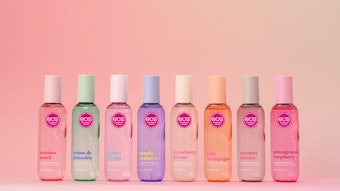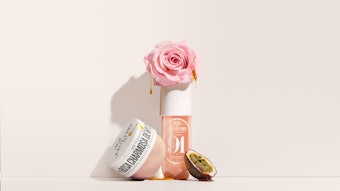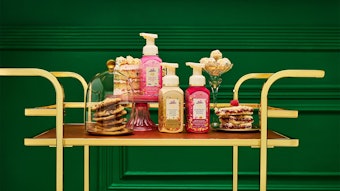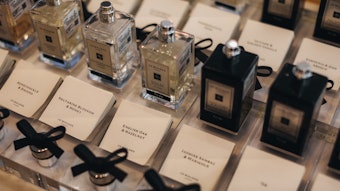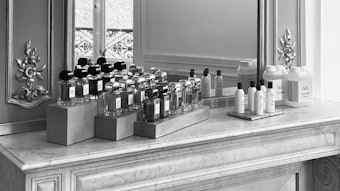
Cover image courtesy of Liz Moores
By Pia Long
I start to worry I’ve driven too far into the forest when I see the road ahead narrow down into a path and almost disappear. There are no signposts, houses or other buildings. If I hadn’t been given such good directions, I’d be struggling to fight the urge to turn back – surely there can be nothing but trees further ahead?
I find the place. The narrow path leads me to a large, rambling plot and a large, rambling house. We’re in New Forest, England.
You’d be forgiven for thinking that a house that has five children, three cats, two dogs, two horses, five chickens, a bearded dragon, two cockatiels, a room full of royal pythons and a tortoise belongs to some kind of hopeless eccentric.
Its owner Liz Moores, the attractive, doe-eyed, ageless brunette, breezily describes herself as a stay at home mom, is tremendous fun, doesn’t take herself at all seriously, has a dirty laugh, and signs off emails with kisses.
So it might come as a little bit of a surprise that she is a serious self-made businesswoman and one of the most successful rising stars of the global artisan perfume scene.
In 2015 her debut fragrances Angelique, Anubis and Tobacco Rose were all shortlisted by the Fragrance Foundation for Best New Independent Fragrance.1 She recently won the Basenotes reader award2 for Salome (two awards, actually – for best feminine fragrance and best niche fragrance) and a third award went for her brand, Papillon Artisan Perfumes (best new house). Salome has sold out and there is a waiting list.
She may be eccentric (show me a perfumer that isn’t, at least a little), but she is far from hopeless.
Shalimar
Granted, our image of the artisan perfumer is definitely of a person at the more eccentric end of the spectrum – and we often imagine these businesses being born out of a combination of naivety, arrogance and ego: “Hey, how hard can it be – I think I’m a perfumer now!”
Liz did not even set out to be a perfumer.
“I’ve worn Shalimar since I was 18 and have built up quite a collection of other perfumes, too,” says Liz, “I had my children, worked as a remedial sports massage therapist and via that, came across aromatherapy. Something made me think. Why is it that when I smell bergamot oil, which is listed as one of the notes in Shalimar, and then smell Shalimar, the two smell nothing alike?”
“That was 11 years ago. My imagination was fired up. I started looking around for the answer, just to satisfy my curiosity, not for any other reason, and discovered that there wasn’t enough information out there about how perfumes are made. I thought to myself: why is it that nobody talks about that? I even went as far as buying some essential oils and knocking up a blend in my kitchen – it was hideous, by the way,” Liz says and howls with laughter, “but that just made me even more determined to find out what made perfume, perfume.”
“In the beginning I looked everywhere for some sort of perfume course, and I didn’t know what I had in mind - the Fragrance Foundation course that they do as distance study was aimed at people in retail sales, but I still did that, and it broadened my knowledge,” Liz explains, “and then I did five days with the late Alec Lawless, which was brilliant - but I did leave the course thinking ‘I haven’t made a perfume’ because to me, what we left with didn’t smell like a perfume. And I wanted to get to a stage where I could make something that I would be proud to wear on myself. So there was still, at this point, no desire to start a business or anything like that.”
“But I’d met Karen Gilbert on Alec’s course and one day I was chatting with her and asked why it is that I can’t seem to make a perfume for love nor money – and she said: you need to use aroma chemicals.”
Anubis
“I went a bit aroma chem crazy,” says Liz and laughs, “they were a revelation to me. I was getting them from Perfumer’s Apprentice in America. And I was going, oh my God, this smells like popcorn, I must order this... so I spent a very, very long time just smelling absolutely everything I could.”
“And I actually just got to a point where I had to tell myself to stop. I was almost fixated; obsessing.”
“I had to order myself to start working on the perfume I’d promised I would make for myself, now that I didn’t have any more excuses. And that’s where Anubis came from,” explains Liz.
At this point Liz was married with children, a housewife who was happy nurturing her family and animals and would have found the idea of launching a perfume brand ridiculous. Her plan was to make a perfume she’d be happy to wear herself.
Liz kept perfumery raw materials and notebooks with her observations about them tucked away in a box until after dinner. “I’d sit in my kitchen and make notes on how everything was behaving and what was happening to the formula. And it took a long time,” she reminisces.
By the time Anubis was finished, it had taken a number of years from the original idea to finished product, and the process had been costly. Liz had pursued her obsession by going on courses, buying books, raw materials and equipment – only to find new obstacles at every turn.
“I’m my own worst critic, but I did also start to get a disparaging vibe from my husband at the time. Like he wasn’t supportive of me,” says Liz, “It made me want to prove him wrong. That I could do it.”
Liz realized that in order to keep tinkering with the Anubis formula, she’d have to justify spending more money on raw materials, and the first ideas about possibly getting it safety tested and sold to friends and family, maybe at a rate of one or two bottles a week started to form. An early business plan was to arrange perfume parties and visit local craft fairs.
“It seems so funny now – but I seriously thought ‘perfume parties – that’s the way to go’ – and actually it really was a good idea for what I was trying to do at the time, but I’d not have in my wildest dreams expected to end up where I am today. I had no idea what I was doing with social media or marketing and had no business plan. I know it sounds like a total cliché to say my business grew organically, but that is exactly what happened,” explains Liz.
Tobacco Rose
“I would have loved to have had formal training. I’d just like to put that out there. I looked everywhere. And if formal training would have been available, I’d have jumped at the chance. I have such a thirst for knowledge,” says Liz.
The job of a corporate perfumer and an artisan DIY perfumer are almost completely different on a day-to-day level. As is typical for truly artisan brands where the owner is also the perfumer, Liz handles most of the other tasks, too: compounding, filling, crimping, sales; and her very successful social media channels.
“I didn’t have a clue about using social media for this sort of thing. Karen Gilbert and my children had to help me open Twitter and Instagram3 accounts; I didn’t even know what those were. For the first three years I just posted photos of my cats and chatted away, and then one day got talking to a lovely chap who turned out to work for Les Senteurs,” says Liz.
Simon, Liz’s live-in partner helps with the business and folds up the cartons, “I struggle with the inserts. If I do them, they go all wonky, so Simon does them.” But there is more to it than that. “Without Simon there wouldn’t be Papillon. He helped me build the business from the ground up and does so much work on it. Sometimes I feel a bit bad that the perfumes take over and he is largely forgotten because I owe him so much.”
Before Simon came along, Liz was married to someone else. “I had a business and property before,” says Liz, “and I’d been very careful to build up a safety net and a nest egg for myself and for my family – for our future. And then one day my husband left and took it all. I went through a very stressful divorce.”
“By this time I had already started working on a fragrance that would become Tobacco Rose. I said to myself, ‘you’re a fool, Liz - you honestly thought you could make perfume and it was just going to happen like that? You got lucky with Anubis, that’s all.’ It was a really difficult time. My marriage had broken down, which I wasn’t too devastated about because it was a hideous point in my life, but there was just so much going on and I think I really pushed myself to work on this perfume.”
“I’d been left in terrible debt by my ex husband... and suddenly there was a whole different driver behind everything - now this was no longer something I was doing for myself as a hobby; I had to make it work because here I was with my children and I had to make a living or we’d be in trouble.”
Tobacco Rose feels melancholy, and like two perfumes, a feminine and a masculine, sitting together in the same bottle, but apart. There’s a rose, and there’s a tobacco. Liz bottled her feelings, literally.
“I do think that if I am cooking after an argument, the food comes out differently, and with Tobacco Rose, something happened during the creative process to infuse it with my sadness – but more than that – I kept working on it almost obsessively. There were 148 modifications and I got so frustrated with it that I packed it away and gave up on it.”
Angelique
With Tobacco Rose sitting in a chest of drawers, no prospect of making her business into a success, and terrible debts looming, it was Liz’s children who inspired her to give perfume one last chance.
“The girls kept coming in to ask me to make them silly scents like cotton candy and I think they instinctively wanted me to not give up when they saw I’d packed everything away,” says Liz. “And almost without realizing what was happening, I started composing a bit of a wistful fragrance in their honor,” says Liz, “looking at them, thinking about where all the time went, and about our future, I created Angelique. It’s deliberately a little bittersweet.”
Accidentally or not, Liz’s children snapped her out of the dread of pressure she now felt to make everything perfect. “I learned it’s okay to stop, and that I don’t have to release the perfect perfume - just get it to a point where I would be happy to wear it myself. Obviously to get it there still takes a lot of work,” Liz laughs, “I did say I am my own worst critic!”
“But as much as I would have loved to have done another 148 mods on Tobacco Rose, I took it out, did one last version of it, drew a line under it and sent it off to the safety tester.”
Salome
Liz owns a vintage photograph of a 1920s flapper girl in a state of undress. This, and her obvious love of the Art Deco aesthetic and classic Guerlain fragrances inspired Salome. The scent contains hyraceum, castoreum, as well as indole.
“Hyraceum and Turkish rose oil transformed the original formula that had been on and off in development for three years,” explains Liz. ”I wanted to achieve a textural effect to the perfume, but couldn’t work out why it wasn’t happening, so I let it sit for a while and came back to it, thinking maybe it just takes a really long time to macerate. I ended up making up different batches and testing them at different stages. I didn’t know why it was doing it, but spotted it was.”
The Social Butterfly
Liz doesn’t want Papillon to be a brand that launches perfumes at the disposable pace we’ve now almost come to accept both from the mainstream and niche sides of the industry. She sees one or two perfumes a year as plenty, and all of her fragrances to date have taken her several years of work. Admittedly, some of the work has been due to her circumstances – lack of formal training, difficulties of having to do all other jobs in the business, too; messy divorce, getting pregnant again just as she was preparing to launch her brand - but when Papillon Artisan Perfumes did launch in 2014, it had customers eagerly waiting to smell Liz’s creations and bloggers queuing up to review her fragrances. She didn’t have to hire a PR agency or pay for advertising.
Visibility and goodwill towards the brand are cornerstones of success in the oversaturated niche market, and something investors who see the niche segment as an easy way to get rich might find, aren’t usually possible to buy. We tend to think that the niche customer is after a unique perfume experience, and yes, that is true, but they also want to have a stronger emotional link to the brand than what they are getting from mainstream. In the case of ultra niche, the perfumer is the brand. One can create a slick niche line that, on the surface, ticks all the boxes, but you can’t force customers to root for your success, even if the perfumes in your line-up might be technically more competent. Certain things can only be naturally grown. Like butterflies in cocoons.
1 http://www.fragrancefoundation.org.uk/news-and-events/latest-news/116/#.WATtAfkrLIU
2 http://www.basenotes.net/perfumenews/3349-papillon-perfumery-mugler-and-dior-are-the-big-winners-in-2016-basenotes-awards
3 https://www.instagram.com/papillon_artisan_perfumes/?hl=en



